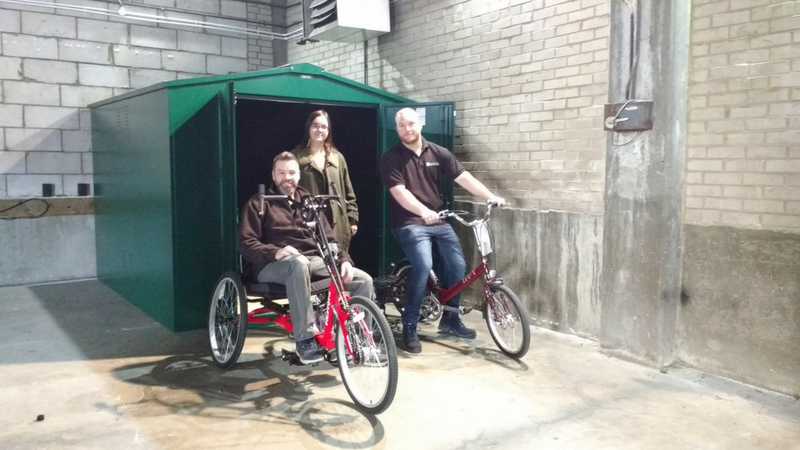
Asgard recently helped out the London based, Wheels for Wellbeing charity, by supplying them with a secure storage unit to keep some of their bicycles safe and secure at their headquarters.
Whilst we were visiting the charity we learnt a great deal about some of the barriers that come between disabled people and riding bikes.
Neil Andrews, the Campaigns & Policy Officer at Wheels for Wellbeing, has kindly answered some questions we presented the charity with.
Cycling has really taken off in the last few years across the UK – particularly since the Tour has WFW seen an increased demand?
We have seen a steady increase in demand (though we wouldn’t say this is linked to the Tour necessarily – possibly more to London 2012’s Paralympic Games). Between 2013 and 2016 we headed a project called Cycling for All (a partnership between ourselves and 3 other inclusive cycling organisations in London, funded mainly by Sport England). During that period, we actively marketed inclusive cycling across the capital. By the end of the project, 14,000 disabled people had taken part in cycling sessions in the capital (and between them had cycled on 50,000 occasions!).
The demand for inclusive cycling is huge, especially from people who otherwise find being physically active difficult. Many more inclusive cycling hubs like ourselves are needed in London and across the country. Cycling by disabled people seems to be this complete blind spot for the general population. Those who are lucky enough to have discovered it find it has the power to transform their lives!
There were 23 million total cycle journeys in London in 2015 (TfL) - we certainly saw a lot when we were down there, how many disabled cyclists are there in London?
Not as many as there could be with better cycling infrastructure and better affordability, but numbers are increasing! By TfL’s own account, in 2015 15% of disabled Londoners were using a bike to get around (compared to 18% for non-disabled Londoners).
We were able to try a few of the bikes when we came to install your shed – they are really great looking machines, presumably quite expensive to buy. What is the typical price range?
Cost is one of the main barriers preventing more disabled people from taking up cycling. Prices for non-standard and adapted cycles range from anything between £800 and £5,000. An average price for a decent non-standard cycle would be something like £2,000 - £3,000.
Cycling is a great way for people with a wide range of disabilities to get around the city, but do you know of much interest in cycling as a sport? i.e. Cycling distances around rural areas outside of London or perhaps on a track.
There are a number of organisations that provide inclusive cycling as a sport, including British Cycling, WheelPower, Handcycling Association UK and the Tandem Club. Along with other bodies, they offer recreational and competitive opportunities for handcyclists, recumbent cyclists and tandem cycling for visually impaired people.
Are there sufficient places where bikes can be locked up securely and do thefts happen often?
Parking and storage for non-standard cycles is a particular problem for disabled cyclists. Nearly all cycle parking facilities are designed for standard two-wheeled bicycles and fail to accommodate the dimensions of non-standard cycles (tricycles, tandems, recumbents, cargo bikes etc). We’re not aware of any research relating to theft of non-standard cycles, but we know from speaking to disabled cyclists that they are more reluctant to park/store their cycle somewhere that does not provide sufficient security.
We have supplied you with one of our huge Gladiator bike sheds, as you have a large carpark, The adapted bikes are clearly much larger than a standard cycle, is storage/access a problem for a typical use?
Same as above really! Non-standard cycles are generally wider, longer and heavier than standard bicycles and also require bigger turning circles, so we often find that cycle parking/storage facilities are generally inadequate in accommodating such needs. We are currently giving a lot of thought to the requirements for an inclusive cycle parking solution and we’d be glad to share that with you if you’re interested in developing your range for this market.



















